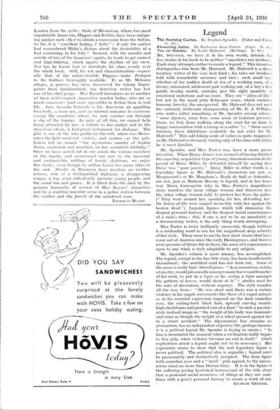Legend.
Burning Cactus. By Stephen Spender. (Faber and Faber.
: is. 6d.)
Flowering Judas. By Katherine Anne Porter. (Cape. is. 6d.) Tea on Sunday. By Leslie :11.alward. (Methuri. 3s. 6d.) .
• Ma. SPENDER, we have it in his own words, intends the five stories in his book to be neither "anecdotes nor incidents.
Each story attempts rather to create a legend." This intention • distinguishes him from Mr. Haiward. Mr. Halward is a docu- mentary writer of the very best kind ;this tales are incidents told with remarkable accuracy 'and tact : each small tale,
whether of the sudden death at tea of a working man, of a dreary, mismated, adolescent pair walking out, of a boy's first public boxing match, cOntains just the right quantity of
emotional undertone and no more. They are "slices of life," but not in the usual grim Zolaesque sense, which excludes humour, brevity, the unexpected. Mr. Halward does not need the curiously irrelevant championship of Mr. E. J. O'Brien, who writes (after remarking of Mr. Spender among others :
"some shyness, some fear, some sense of isolation prevents them, we feel, from walking along the road for an hour -in happy conversation with a tramp or a sailor ") : "these social
barriers, these inhibitions evidently do not exist for Mr. Halward." This odd hiking scale of values is quite inapposite as Mr. Halward is obviously writing only of the class with which he is most familiar.
Mr. Spender, and ."-Miss Porter too, have a more poetic intention. When Henry James was accused of having falsified
the capering, acquisitive type of young Americanwoman in the
person of Daisy Miller, he defended himself by saying that Daisy was "pure poetry." Daisy Miller in other words is a legendary figure as Mr. Halward's characters are not, as
Maupassant's or Mr. Maugham's, Boule de Suif or Ashcnden, are not, just as Madame Bovary is legend, and in her lesser way Maria Concepcion who in Miss Porter's magnificent story murders the loose village woman and discovers how the other village women rally to protect her from the police. (" They were around her, speaking for her, defending her ;
the forces of life were ranged invincibly with her against the beaten dead.") Legend, figures which will dramatise the
deepest personal fantasy and the deepest moral consciousness of a man's time : this, if one is not to be an anecdotist or a documentary writer, is the only thing worth attempting.' Miss Porter is twice brilliantly successful, though brilliant is a misleading word to use for the magnificent deep sobriety of her style. These seem to me the best short stories that have come out of America since the early Hemingways, and there is more promise of future life in them, the sense of a consciousness open to any wind, a style adaptable to any subject.
Mr. Spender's volume is more uneasy, less accomplished. The legend, except in the fine title story, has been insufficiently dramatised; the umbilical cord has not been cut. Some of the prose is really bad : Sitwell prose : "As a seamstress, sewing a tapestry, would jab a needle amongst many leaves and branches of her work, to put in a tiger, so he, seeing a tiger amongst the pattern of leaves, would shout at it " : similes used for the sake of decoration, without urgency. The style wanders all the way from : "lie was short and there was a certain violence in his supple movements like those of a caged animal, as in his muzzled expression imposed on the dark comelian eyes, the curling-back black hair, upward curving mouth, high cheekbones and pointed ears Of a faun" to such a pa.sskiii- ately realised image as "the weight of his body was inanimate and cruel as though the weight of a wheel pressed against her in a street accident." The dipsomaniac boy remains an abstraction, has no independent objective life, perhaps becauke it is a political legend Mr. Spender is trying to create : " him is incarnated the moment when a civilisation really begins to lose grip, when violence becomes an end in itself." (Such explicitness about a legend ought not to be necessary.) But experience seems to show that the real legendary figure is never political. The political idea is arguable ; legend mat be passionately and instinctively accepted. The faun figure with corrielian eyes and a " lurid " grin appeals to the uncon- scious mind no more than Dorian Gray. It is in the figure of
the suffering prising hysterical homosexual of the title story that a profound social awareness of things as they are com- bines with a poet's personal fantasy to create a work of art. Gamfam GRE.E.NR.


















































 Previous page
Previous page